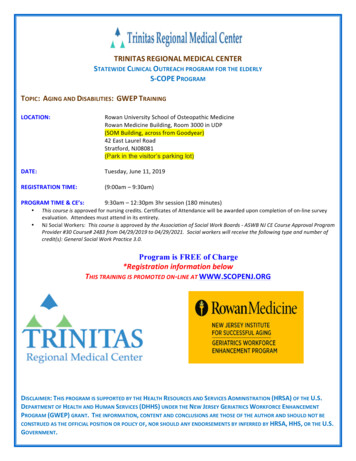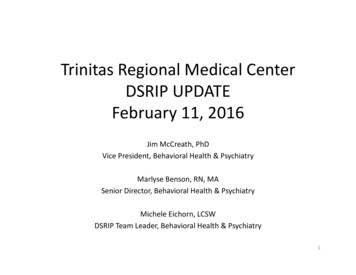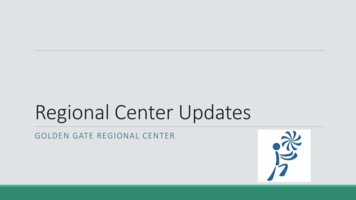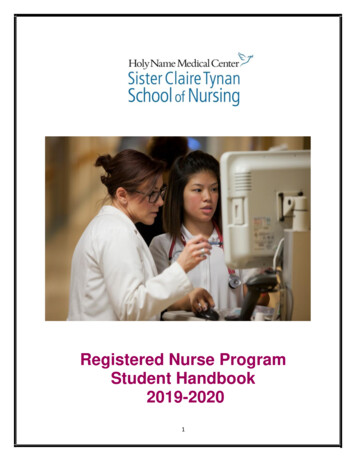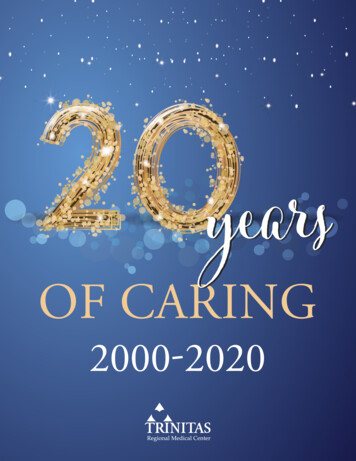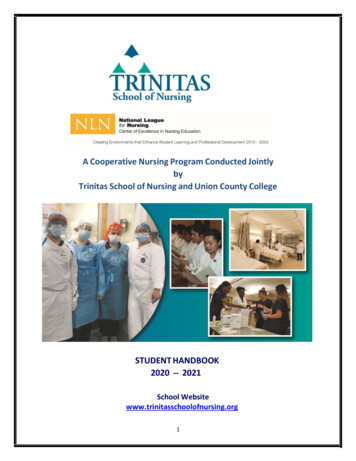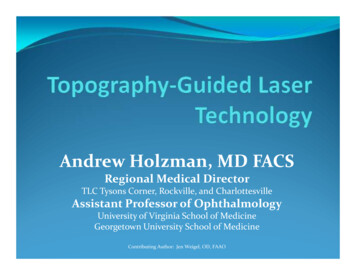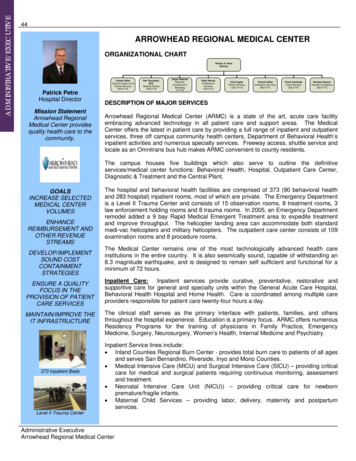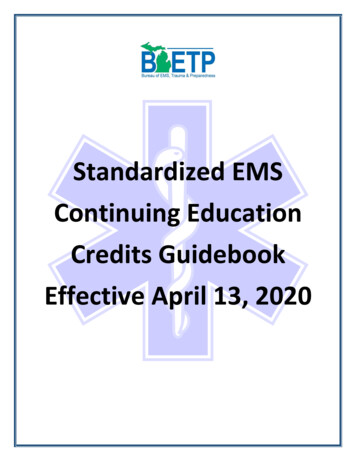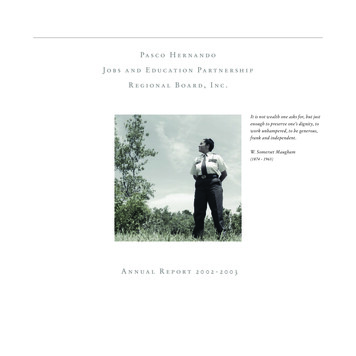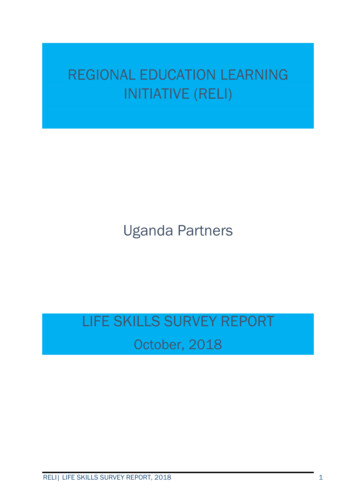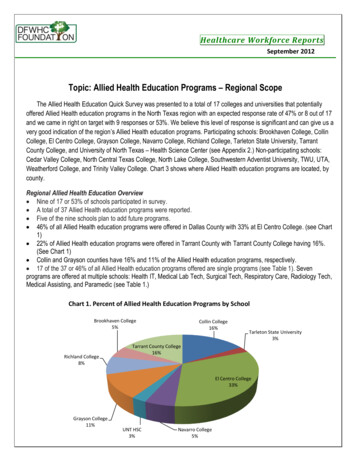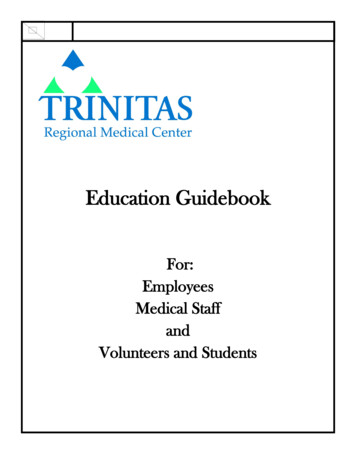
Transcription
Education GuidebookFor:EmployeesMedical StaffandVolunteers and Students
2TABLE OF CONTENTSAdvance Directives4Americans with Disabilities Act (ADA)4Cell Phone Use and Other Wireless Devices4Confidentiality/HIPAA4Corporate Compliance Plan/Code of Conduct/Federal False Claims Act5Customer Service Excellence Standards5Do Not Resuscitate (DNR)5Emergency Codes6Emergency Medical Treatment and Active Labor Act (E.M.T.A.L.A.)6Employee Rights7Ethics7Ethical Issues at Trinitas Regional Medical Center7Failure Mode and Effect Analysis (FMEA)7Fall Prevention8Important Names to Remember8Informed Consent8Hazard Communication Plan and Safety Data SheetsLatex Allergy8Management of Information9Medical Equipment Management9Organ/Tissue Donation9Pain Management9Pastoral Care10Patient/Family Education10Patient Rights10
3Patient Safety and the MRI Machine10Performance Improvement10Population Served11Recognition and Response to a Change in a Patient’s Condition:Rapid Response Team11Restrains and Seclusion: The Use of Restraints in Acute Care11Safety and Quality Concerns11Security Management11Sentinel Events12Smoke Free Campus12Standard Precautions12Trinitas Regional Medical Center Mission, Vision and Values13Using Best Practices in Providing Quality Care at TRMC14National Patient Safety Goals14Joint Commission Jewels: Who’s Who at Trinitas RMC19Education Update: Understanding Cultural Diversity-Understanding Ourselves20
4ADVANCE DIRECTIVESAn Advance Directive (Living Will) is a document containing written instructions prepared by patients in advance ofmedical treatment to explain what kind of medical care they want in the event that they become unable to make adecision for themselves. Patients are asked at the time of admission if they have an Advance Directive. TrinitasRMC provides education and assistance for the completion of an Advance Directive. An Advance Directive form isavailable from the Admitting Department. Conflicts related to compliance with Advance Directives are referred tothe Medical Director. Changes can be made to an Advance Directive at any time by adding or removing items.AMERICANS WITH DISABILITIES ACT (ADA)TRMC is an Equal Opportunity/Affirmative Action employer. All qualified applicants will receive consideration foremployment without regard to race, color, religion, sex, age, national origin, disability, protected veteran status, andor any other status protected by federal, state, or local law.The following are available for employees and/or patients with special needs to comply with ADA guidelines:Physical Facilities: Designated parking spaces A barrier-free facility Sight impairment modifications in select elevators Signage consistent with ADACommunication Aides:Qualified sign and qualified language interpreters will be provided at no cost to any patient who needs or requeststhis service. A TDD/TTY telecommunication device is located in the Emergency Room for public use. Amplified phones are available by contacting the Communications Department. Access to a sign language interpreter can be provided through a Video Remote Service or an on-site interpreter. A qualified language interpreter is available via phone access throughout the Medical Center 24/7 and offers thetranslation of 150 different languages. The service is available by using the ―Clear Link‖ dual-handset phonesavailable on the patient care units or by direct dial access. Call the Operator if any assistance is needed inaccessing a qualified interpreter via phone. A list of eligible employees who may be called upon to serve as interpreters is available on the TRMC Intranet.CELL PHONE USAGE AND OTHER WIRELESS DEVICES The use of cell phones and other wireless devices is restricted to outside of patient areas, nursing units anddiagnostic departments so not to cause interference to medical equipment. Cell phones and other wireless devices can be used in all lobbies, waiting areas and patient family lounges. Physicians can use these devices in non-public, non-clinical areas, offices, on call rooms and lounges to ensurethe privacy of their phone calls. Security, Patient Escort and other TRMC personnel whose duties are essential to patient care may use MedicalCenter issued and approved portable and wireless communication devices in all areas of the Medical Center.CONFIDENTIALITY/HIPAA Trinitas RMC maintains compliance with the ―Health Insurance Portability & Accountability Act‖ (HIPAA)enacted by Congress in 1996. HIPAA established standards for privacy and confidentiality of individually identifiable health information.This includes any information that may be used to identify a patient.The HIPAA Security Officer (Donald Caldwell)The HIPAA Security Officer is responsible for the development, implementation, maintenance of and adherence toTrinitas’ security policies and procedures as they relate to patient health information in compliance with regulations.
5Who is responsible for Patient Confidentiality at Trinitas? ALL Trinitas employees, clinical and non-clinical are responsible for patient confidentiality. All Trinitas employees sign a confidentiality statement when hired.How are we responsible for Patient Confidentiality at Trinitas? Patient information is not discussed in elevators or other areas where it may be overheard. Patient names are not posted in public areas (i.e. on walls, doors, bulletin boards, etc.). Patient information is never disclosed to unauthorized persons including family and friends, without patientauthorization or permission. Computer passwords are not shared. Patient documents are discarded in confidential bins or a shredder. Privacy is maintained when an employee becomes a patient. Violation of confidentiality is subject to disciplinary action which may include termination and/or legalprosecution.CORPORATE COMPLIANCE PLAN/CODE OF CONDUCT/FEDERAL FALSE CLAIMS ACTAs Trinitas RMC employees, we share in the: Commitment to ―do what is right‖ and Pledge to continually strive to uphold the highest ethical and legal standards in carrying out the Mission andbusiness practices of Trinitas.For more information please read the Summary of the Trinitas Health Code of Conduct and Corporate CompliancePlan, refer to the Federal False Claims Act Policy and/or call the Compliance Office at 994-5225.CUSTOMER SERVICE EXCELLENCE STANDARDSTrinitas has developed Customer Service Standards to help attain the highest level of customer satisfaction.These Standards of Excellence rsonal AppearanceTeamworkStewardshipWait TimeNRC Picker is the patient survey used at Trinitas Regional Medical Center for the HCAHPS (HospitalConsumer Assessment of Healthcare Providers and Systems) scores for all In-Patient Units as well as theEmergency Department.DO NOT RESUSCITATE (DNR)It is the policy of Trinitas Regional Medical Center to recognize that life-prolonging treatment is not alwaysappropriate. A DNR (No Code) order indicates that no Basic or Advanced Life Support efforts (as defined by theAmerican Heart Association) will be initiated in the event of cardiopulmonary arrest. DNR/Therapeutic Optionsdecisions are assessed during the course of care and may be modified through the shared decision making of thepatient/surrogate/healthcare team within the framework of medically appropriate care. The provision of comfortcare, including the patient’s emotional and spiritual needs must be met at all times. In the absence of a DNR (NoCode) order, full resuscitation procedures will be initiated. The physician will complete the ―DNR/Therapeutic Options‖ order form DNR order is entered into the clinical information system DNR label is placed on the front of the Medical Record Identify patient with purple DNR wristband Immediately notify the physician if a patient or surrogate elects to revise a DNR/Therapeutic Options Order, and If ethical or legal issues arise, refer to the policy on Ethics Consultation Guidelines.
6EMERGENCY CODES (DIAL 5050)Code RedCode BlueCode WhiteCode PinkCode AmberCode YellowCode GrayCode OrangeCode TriageCode SilverCode ClearFireAdult Medical EmergencyPediatric Medical EmergencyInfant AbductionMissing ChildBomb/Bomb ThreatSecurity Emergency/Patient ElopementHazardous Materials IncidentDisaster: Internal/ExternalPerson with a Weapon/Hostage SituationAll ClearWHEN A FIRE OCCURSR escue people in immediate danger.A larm (activate the fire alarm) and dial 5050 to report location.C contain by closing doors.E xtinguish/E vacuate (using good judgment when deciding to put out the fire).IF EVACUATION IS NECESSARY Evacuate ambulatory patients first. Horizontal evacuation first—through the fire doors into a safe area on the same floor. Vertical evacuation is used only if your way is blocked by smoke or flames. Vertical evacuation ismoving from one floor to a safe floor, always downward. The exception is the basement where theevacuation moves upward to the first level.WHEN USING THE FIRE EXTINGUISHERP ull the pinA im the extinguisher at the base of the fire.S queeze the handle while holding the extinguisher upright.S weep back and forth to extinguish the fire.EMERGENCY POWER Electrical receptacles that are red or labeled ―emergency power‖ are connected to the emergency generatorsystem. If there is a power failure, all lights would be off except for those that connect to the emergency power system. All patient life support equipment must be plugged into a red receptacle. If emergency power fails or does not come on during a failure of normal power, immediately dial 5050 to notifyFacilities Management of this condition. Other utility failures are covered by policy and are managed by the Department Supervisor or NursingAdministrative Supervisor.EMERGENCY MEDICAL TREATMENT AND ACTIVE LABOR ACT (E.M.T.A.L.A.) E.M.T.A.L.A. is a federal minimum standard of care. The general principal of E.M.T.A.L.A. is nondiscriminatory treatment for all patients who come through thedoors, regardless of their ability to pay. Any patient who has a medical emergency or is in active labor, has the right to receive, within the capabilities ofthe Medical Center’s staff and facilities: An appropriate Medical SCREENING EXAM
7 Necessary STABILIZING TREATMENT, and, if necessary An appropriate TRANSFER to another facility, if appropriate This applies to all patients even if the patient cannot pay or does not have medical insurance.EMPLOYEE RIGHTSIf an employee has a cultural or religious belief that interferes with patient care, the employee is directed to see his/her Department Supervisor or the Nursing Administrative Supervisor who will review the situation and make adecision based on the employee’s needs as well as those of the patient.All employees have the right to work in an environment that is free from discrimination and harassment. Harassment (including sexual harassment) consists of unwelcome conduct, either verbal, physical or visual, thatis based upon a person’s protected status, such as sex, race, religion national origin, age, handicap, disability,sexual orientation or other legally protected group status. All employees who believe that they may be subject to or who have witnessed harassment as defined above,should meet with and report the harassment to the Vice President of Human Resources. All complaints/concerns of harassment received will be kept confidential.Trinitas Employees have the right to work in an environment that is drug free. Trinitas is a ―Drug Free Workplace‖. Any employee suspected of being ―impaired‖ due to alcohol or substance abuse will be removed from the areaimmediately and the supervisor will be notified. Discipline may include written warnings, suspension without pay, mandatory participation in an appropriatesubstance abuse assistance or rehabilitation program, termination of employment or any combination thereof.ETHICSThe Ethics Committee at Trinitas RMC provides case consultation to help patients, families and professionals withespecially difficult decision making. An Ethics Consultation may be requested by the patient, family member orhealth care surrogate, or by any nurse, physician or other professional caregiver.To arrange an Ethics Consultation please call: Pastoral Care The Medical DirectorETHICAL ISSUES AT TRINITAS REGIONAL MEDICAL CENTERTrinitas RMC embraces every employee with the Mission, Vision and Core Values of the Institution through theteachings of members of Pastoral Care and our Corporate Compliance Officer. Employees of Trinitas are committedto compassion, community, reverence for life, responsibility, stewardship and charity. Ethical issues are addressedthrough our HIPAA and Compliance Policies, accessible to all employees on the Trinitas Intranet. In addition,members of our Pastoral Care Department and Corporate Compliance Officer are available to employees when facedwith ethical issues and dilemmas related to job duties and responsibilities.FAILURE MODE AND EFFECT ANALYSIS (FMEA) A systematic method to identify possible failures that pose the greatest overall risk. Changes are made in processes to make them safer. Near misses are analyzed to determine how processes fail, possible cause of the failure, and consequences of thefailure. Risks are analyzed to see the frequency, severity and consequences of the failure.
8FALL PREVENTIONTrinitas RMC has implemented the ―Catch a Falling Star‖ program to prevent patient falls. The purpose is two fold: To provide guidelines for screening or assessment of patients at risk for falling. To identify preventive measures or interventions to reduce injury from risk of falling.This Policy ensures that the patient has a ―yellow‖ fall risk identification (ID) band, that a magnetic falling star signis at the room’s door jam and a ―star label‖ is attached to patient’s chart binder to identify the patient at risk for fall.See Policy: “Fall Prevention”, under Organizational; Chapter: Patient Safety.IMPORTANT NAMES TO REMEMBERPhil SolomonTRMC Safety Officer/Emergency PreparednessDeborah DolanRisk Management Director/Patient Safety OfficerExtension 8257Extension 5153INFORMED CONSENTIt is the policy of Trinitas RMC to provide treatment upon informed consent of the patient or legal representative.The attending physician bears the legal responsibility for obtaining the informed consent from the patient or legalrepresentative. The attending physician must disclose the name and nature of the proposed treatment, interventionsor procedure, reasonable risks/complications and benefits. This can be followed by the securing of the signature onthe consent form by the Registered Nurse or credentialed practitioner. A consent form is required for any operative or invasive procedure, for the transfusion of blood products,administration of chemotherapy, radiation therapy and dialysis Consent forms are valid for 30 days unless revoked by the patient or authorized individual Refer to Organizational Policy , “Informed Consent” for exceptions and special circumstancesHAZARD COMMUNICATION PLANInformation about hazardous chemicals and substances is provided to all exposed and potentially exposed employeesthrough a variety of measures. Among these are Safety Data Sheets (SDS) formerly called Material Safety DataSheets (MSDS) accessed via HazSoft, Chemical Inventory Lists, container labels, placards, signs, training andeducation.SAFETY DATA SHEETS (SDS)Safety Data Sheets contain information on the chemicals present in a product and how to use, transport and storethem. They also contain information on how to protect yourself from this potentially hazardous chemical. Trinitassubscribes to a comprehensive on-line service called ―HazSoft‖. Managers can obtain access to ―HazSoft‖ by usingany web-enabled computer.Employees should: Know where to get information about hazardous substances Learn to read and understand labels and SDS Use proper protective equipment and clothing Do not smoke, eat or drink around hazardous substances Ask questionsLatex AllergyLatex or ―natural rubber is used in the production of many products used on a routine basis in the hospital and athome. If you think you are having an allergic reaction to latex, complete an Employee Illness/Injury report and toEmployee Health for evaluation.All patients should be screened for latex allergy. If latex allergy is determined or suspected all latex products shouldbe removed from the patient’s room. Latex Carts with latex-free supplies are available from Central Supply for
9those patients with a suspected or determined latex allergy.MANAGEMENT OF INFORMATIONTrinitas focuses on obtaining, managing and using information to improve patient outcomes. The following types ofinformation are obtained, managed and used within the Medical Center: Patient –specific: information found in the medical record including demographic, clinical and financial. Knowledge-based: journals, references and patient education materials. Aggregate data: data gathered over time including infection rates, communicable diseases, incident reports,financial reports, etc. Comparative performance data: data contributed to the New Jersey Department of Health and NRC Pickersurveys for comparative purposes and benchmarking.The Privacy Officer: (Valdery Campos)The Privacy Officer is responsible for managing all ongoing activities related to the development, implementation,maintenance of and adherence to Trinitas policy and procedures relating to privacy of and access to patient healthinformation in compliance with regulations and the privacy practices at Trinitas.The Privacy Officer works with the HIPAA Security Officer to: Ensure alignment of privacy and security policies, procedures and practices. Address and ensure disaster recovery and business continuity of patient health information.MEDICAL EQUIPMENT MANAGEMENTFor routine repair of medical equipment, call BioMed at Extension 5292 or call the Operator to dispatch abiomedical technician. Tag the equipment as ―out of service‖. For Patient Transport Equipment (stretchers andwheelchairs) , tag as ―out of service‖ and notify Environmental Services at 5077. If a device is suspected of causingor contributing to death, serious injury or illness, immediately disable the device, administer patient needs, thenfollow procedure outlined in the Safety Policies. Make sure not to alter equipment settings and any attachments sothat a complete evaluation of the cause of the equipment failure can occur.ORGAN/TISSUE DONATIONTrinitas RMC in accordance with federal and state requirements such as the Center for Medicare/Medicaid Services(CMS), the New Jersey Department of Health and the Joint Commission is mandated to refer all deaths or pendingdeaths to the Sharing Network for the determination of ―medical suitability‖ for organ and tissue donation and toensure that families are provided the option of donation in compliance with the law. The Medical Center in thisprocess cooperates with the NJ Organ and Tissue Sharing Network which is the federally designated, State certified,organ procurement organization for Trinitas RMC.PAIN MANAGEMENTTrinitas RMC recognizes that: Pain is recognized as being subjective and the most reliable indicator of pain is the patient’s self report. Patients deserve pain management that respects their choices, incorporates their psychosocial, spiritual andcultural values, supports their participation in the care provided and recognizes their right to achievement of theirpersonal health goals.Policy Highlights: All patients will have an assessment of their pain upon admission. Reassessment of pain will be done at appropriate intervals. The clinical staff will work together with the patient to establish a goal for pain relief and will develop andimplement a plan to achieve that goal. Patients and their families will receive education regarding their pai
Trinitas Regional Medical Center Mission, Vision and Values 13 . The use of cell phones and other wireless devices is restricted to outside of patient areas, nursing units and . substance abuse assistance or rehabilitation program
